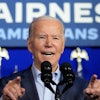ORAN, Algeria (AP) -- Russia proved only a half-hearted helper to OPEC at a key meeting Wednesday aimed at boosting oil prices, and distanced itself from talk of a closer union with the oil producers' club.
All eyes were on Russia at the OPEC conference in Oran, Algeria, as the group's No. 1 outsider and the world's No. 2 oil producer. But Russia appeared reluctant to trade its traditional independence for tighter ties with the 13-nation group.
Russian Deputy Premier Igor Sechin said his country's oil companies could slash output next year to help bolster tumbling crude prices, but stopped short of solid commitments beyond cuts the struggling producers have already made.
Neither OPEC nor Russia announced any decisions Wednesday on closer ties between the two, despite recent talk from Russian officials about possible cooperation.
Sechin said Russia had proposed "permanent observer status" but said the group still has to determine what that means.
Sechin did not rule out full membership eventually, but said, "We are not rushing."
A Russian delegation member said that despite the talk of closer cooperation, joining OPEC as a full member is not in Russia's interest. He spoke on condition of anonymity because he was not authorized to comment to the media.
Calling the current prices "catastrophic," he said that Russian companies had already lost hundreds of millions of dollars because of the drop in oil prices in recent months.
As he spoke, eight Russian oil executives standing behind him looked soberly at the floor.
Sechin said Russian companies had agreed to cut production by 350,000 barrels a day -- but later clarified that those cuts had already taken place in November. He then floated a possible further cut of 320,000 barrels a day in 2009, but said a final decision would depend on prices.
"The decision is based on economic assumptions, due to losses that our companies are facing," Sechin told The Associated Press.
He warned that any major cuts would have "extreme long-term consequences."
But the cuts appeared to be a way of dressing up Moscow's inability to keep up present output levels because of lagging investment. Even before Sechin's comments, Russian output was expected to decline by 1 percent this year and by around 2 percent in 2009.
London-based analyst John Hall said, "I very much doubt Russia will do anything at all."
"OPEC is alone at present until non-OPEC producers and in particular Russia demonstrate their allegiance to OPEC," he said.
While any union with OPEC appeared to have fizzled for now, Russia was looking to try to launch a gas producers' group at a forum in Moscow later this month.
Sechin said the gas-producing OPEC members "expressed interest" Wednesday in joining such a group.
"There is understanding over what documents will be signed in Moscow. This work is similar to that which OPEC does," he said. He stressed that the group would not be a "conspiracy."
"It's a question of protecting the interests of producers and coordinating their work," he said.
Russia's heavily oil-dependent economy is bleeding revenue as crude prices fall, and the government is scrambling to adjust spending plans for next year.
Sechin said Russia's budget for 2008 was based on a price of $70, and that "overall the indicators for this year are positive" because of the high prices earlier in 2008. For next year, Russia is counting on $50 a barrel prices, he said.
"Next year will be difficult," he said.
Associated Press writer Alfred de Montesquiou in Oran contributed to this report.






















